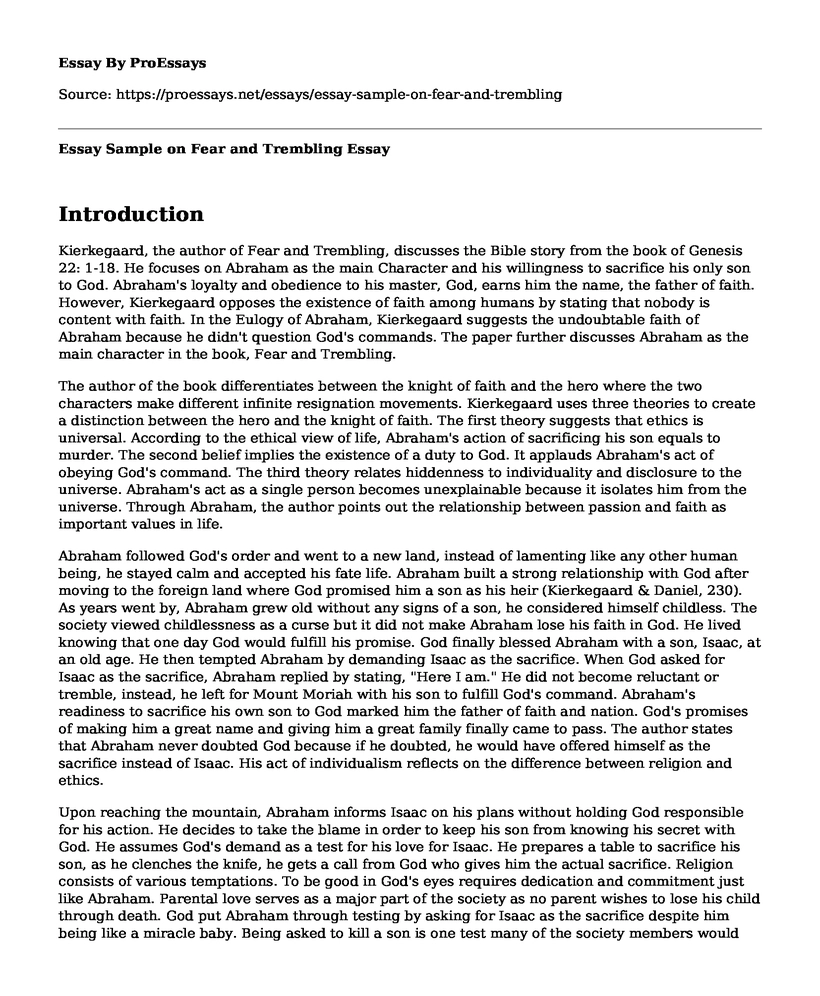Introduction
Kierkegaard, the author of Fear and Trembling, discusses the Bible story from the book of Genesis 22: 1-18. He focuses on Abraham as the main Character and his willingness to sacrifice his only son to God. Abraham's loyalty and obedience to his master, God, earns him the name, the father of faith. However, Kierkegaard opposes the existence of faith among humans by stating that nobody is content with faith. In the Eulogy of Abraham, Kierkegaard suggests the undoubtable faith of Abraham because he didn't question God's commands. The paper further discusses Abraham as the main character in the book, Fear and Trembling.
The author of the book differentiates between the knight of faith and the hero where the two characters make different infinite resignation movements. Kierkegaard uses three theories to create a distinction between the hero and the knight of faith. The first theory suggests that ethics is universal. According to the ethical view of life, Abraham's action of sacrificing his son equals to murder. The second belief implies the existence of a duty to God. It applauds Abraham's act of obeying God's command. The third theory relates hiddenness to individuality and disclosure to the universe. Abraham's act as a single person becomes unexplainable because it isolates him from the universe. Through Abraham, the author points out the relationship between passion and faith as important values in life.
Abraham followed God's order and went to a new land, instead of lamenting like any other human being, he stayed calm and accepted his fate life. Abraham built a strong relationship with God after moving to the foreign land where God promised him a son as his heir (Kierkegaard & Daniel, 230). As years went by, Abraham grew old without any signs of a son, he considered himself childless. The society viewed childlessness as a curse but it did not make Abraham lose his faith in God. He lived knowing that one day God would fulfill his promise. God finally blessed Abraham with a son, Isaac, at an old age. He then tempted Abraham by demanding Isaac as the sacrifice. When God asked for Isaac as the sacrifice, Abraham replied by stating, "Here I am." He did not become reluctant or tremble, instead, he left for Mount Moriah with his son to fulfill God's command. Abraham's readiness to sacrifice his own son to God marked him the father of faith and nation. God's promises of making him a great name and giving him a great family finally came to pass. The author states that Abraham never doubted God because if he doubted, he would have offered himself as the sacrifice instead of Isaac. His act of individualism reflects on the difference between religion and ethics.
Upon reaching the mountain, Abraham informs Isaac on his plans without holding God responsible for his action. He decides to take the blame in order to keep his son from knowing his secret with God. He assumes God's demand as a test for his love for Isaac. He prepares a table to sacrifice his son, as he clenches the knife, he gets a call from God who gives him the actual sacrifice. Religion consists of various temptations. To be good in God's eyes requires dedication and commitment just like Abraham. Parental love serves as a major part of the society as no parent wishes to lose his child through death. God put Abraham through testing by asking for Isaac as the sacrifice despite him being like a miracle baby. Being asked to kill a son is one test many of the society members would fail because of the lack of patience, trust, and faith in the supreme being. Through Abraham, the readers learn that ethics associates with the universe, mediation, absolute mind, recollection, and infinite resignation. Human beings live with the aim of acting for the greater good. Religion relates to the absurd, paradox anxiety, repetition, and leap of faith. Abraham generates the belief that religion is higher than ethics. Abraham's faith in religion made him the greatest person on earth, his faith exhausted him above the society elders who lived through ethics.
Conclusion
In conclusion, every human being has a level of greatness and legacy. For instance, a person may become great through the virtue of self-love and hard work in life while another becomes great through his love for other people. God's love surpasses both self-love and love for the people as shown by Abraham. The story of Abraham indicates the greatness of God's love among all other types of love in the world. Coming from an anti-Christ background, Kierkegaard creates tensions between the church and society. He uses Abraham in bringing out a deeper concept on the inadequacy of the system of Hegelian and the significance of individual's radical freedom. Ethics set the behaviors of community members as it applies to society as a whole. On the other hand, religion involves singularity, a person's belief in religion depends on his perspective of good and evil.
Works Cited
Kierkegaard, Soren, and Daniel Marino Gordon. Fear and trembling and the sickness unto death. Princeton University Press, 2013.
Cite this page
Essay Sample on Fear and Trembling. (2022, Nov 30). Retrieved from https://proessays.net/essays/essay-sample-on-fear-and-trembling
If you are the original author of this essay and no longer wish to have it published on the ProEssays website, please click below to request its removal:
- Text Analysis With the Help of Structural Diagram Exercise
- Essay on Paul's Letter to the Philippians: Interpretative Issues
- Critical Essay on The Book of Genesis
- Paper Example on Theories of Kant and Spinoza
- Fetal Abortion Christian View Essay Example
- Essay Sample on Hinduism: Exploring Its Basic Beliefs and Vedas as the Ultimate Authority
- Free Essay Sample on Interpreting Bible Scriptures







